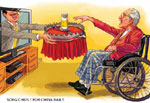Throwing cold water on hot money
Updated: 2013-05-25 07:59
By Xin Zhiming (China Daily)
|
|||||||||||
The State Administration of Foreign Exchange released a guideline on May 6 that tightened scrutiny of export invoices and imposed limits on long yuan positions.
And on May 8, for the first time since late 2011, the central bank resumed the issuance of bills, a move aimed at sterilizing money supply in the market. Analysts have taken it as a sign that the central bank has joined hands with the foreign exchange regulator to battle hot money.
The dual moves constitute a de facto admission that the risks of hot money have become substantial and policymakers will not sit idle.
After strengthening monitoring of trade claims and increasing the sterilization of the money supply, the authorities do not have many tools to tackle the speculative capital that will not have an undesirable impact on the economy.
Theoretically the country can discourage the influx of hot money by cutting interest rates, but given the already ample liquidity in the domestic market, such a move will have a high price tag.
Policymakers need to avoid pouring oil on the flames.
The exchange rate of the renminbi has risen wildly against foreign currencies recently. Its daily reference rate has risen by 1.5 percent against the US dollar this year, with about 1 percent gained since April. It rose 0.23 percent against the dollar over the whole of last year.
Such a sharp rise is hard to understand given the country's fragile economic fundamentals and the rapid rise in the dollar in the past months.
Right or wrong, the market has generally deemed the daily reference rate of the renminbi as reflective of the central bank's stance. The continually rising rate, therefore, could easily lead to the false impression that the Chinese authorities seek faster renminbi appreciation, thus further encouraging long yuan positions.
China is rightly seeking to gradually liberalize its financial regime and make the mechanism of the renminbi's exchange rate formation more flexible and market oriented. However, the short-term strong appreciation is a great boost for speculative foreign capital.
As part of its reform agenda, the government may also gradually expand the daily floating band for the renminbi against the dollar, as a senior central bank official hinted in April.
Analysts think the expansion of the floating band could happen in July. This will make the renminbi more flexible, which will also be a major step in the country's drive to liberalize the foreign exchange market and internationalize its currency.
But some analysts worry that the move could be misinterpreted by the market as a sign of the central bank wanting faster renminbi appreciation.
Given the potential pitfalls, the monetary authorities must better coordinate their decision-making to minimize its impact on the country's economic stability.
The author is a senior writer with China Daily. E-mail: xinzhiming@chinadaily.com.cn
Related Stories
China banks curb loans to commodities firms in hot-money battle 2013-05-23 10:24
China's trade surplus figures 'over-inflated' 2013-05-22 05:36
PBOC faces balancing act with rate, inflation 2013-05-14 01:41
Hot money inflows targeted 2013-05-07 01:59
Printing self-illusions a risky game 2013-02-06 07:41
China's foreign exchange funds fall in Nov 2012-12-15 13:31
Today's Top News
Germany to pay $1b for ageing Holocaust victims
Beijing seeks cooperation with US on cyberattacks
China to speed up service growth
Infant's fall in pipe probed
Developer invests $1.5b in London
Schoolchildren taught to avoid sexual assault
Traffickers await appeal verdict
Female condoms, a new choice
Hot Topics
Lunar probe , China growth forecasts, Emission rules get tougher, China seen through 'colored lens', International board,
Editor's Picks

|

|

|

|

|

|





